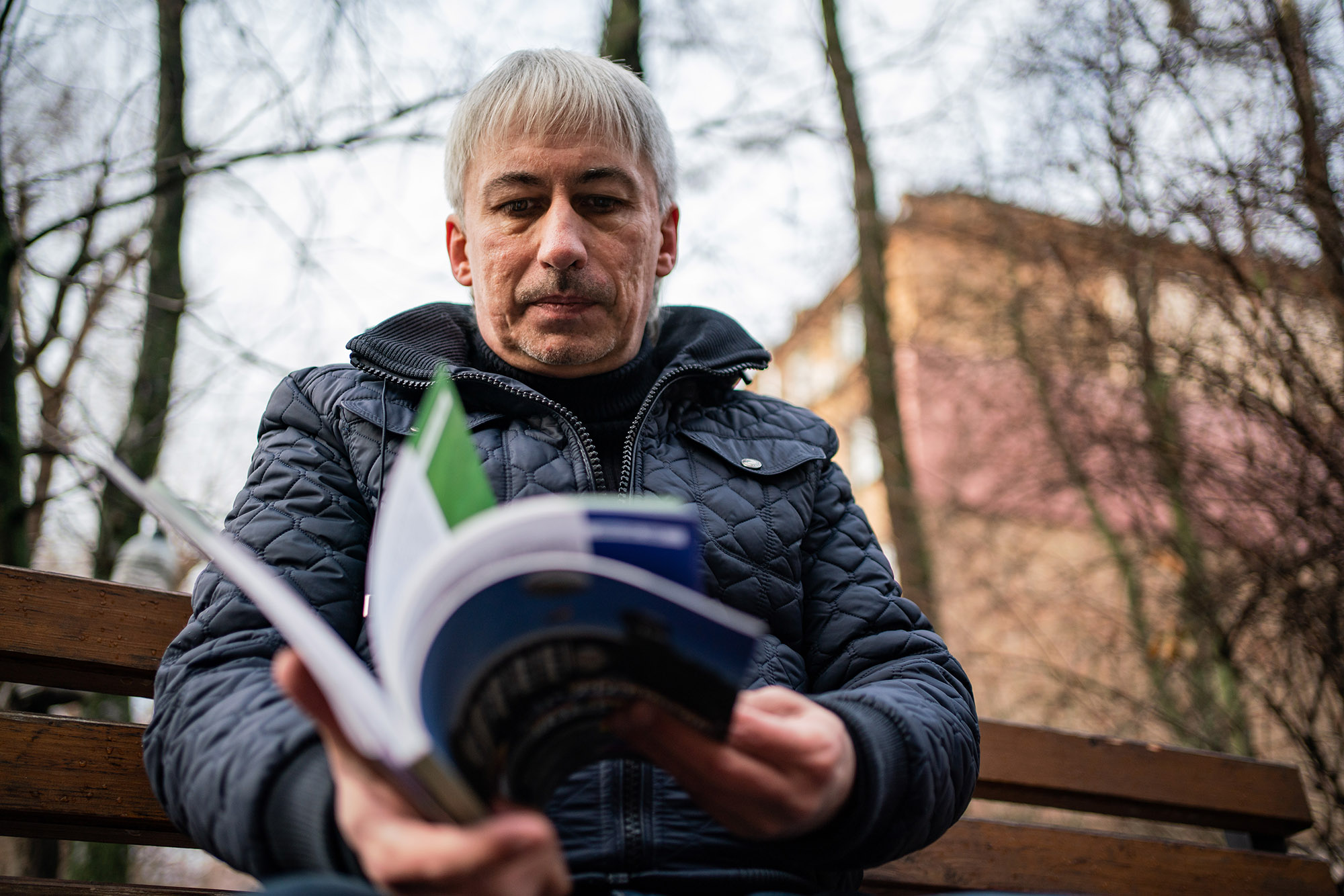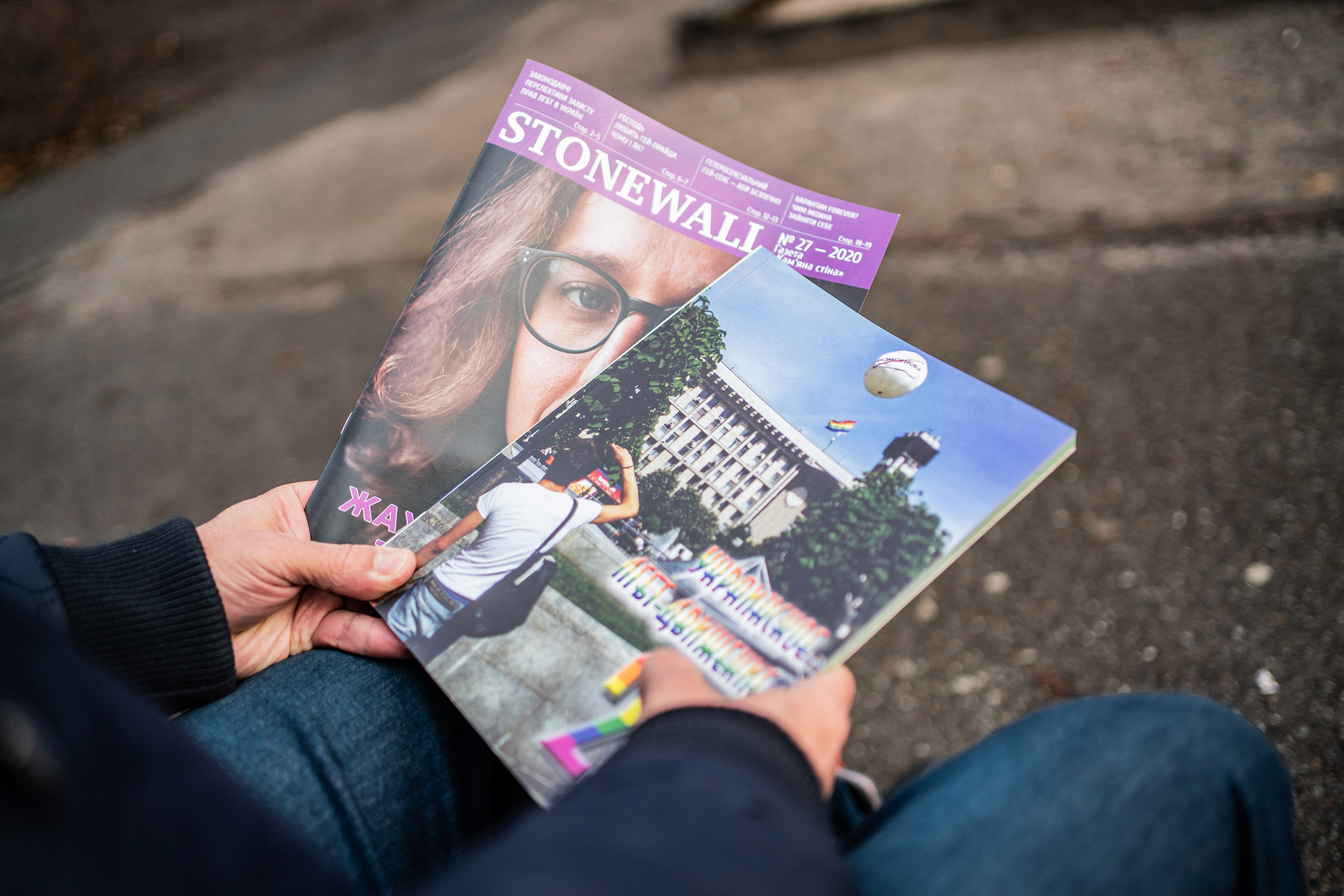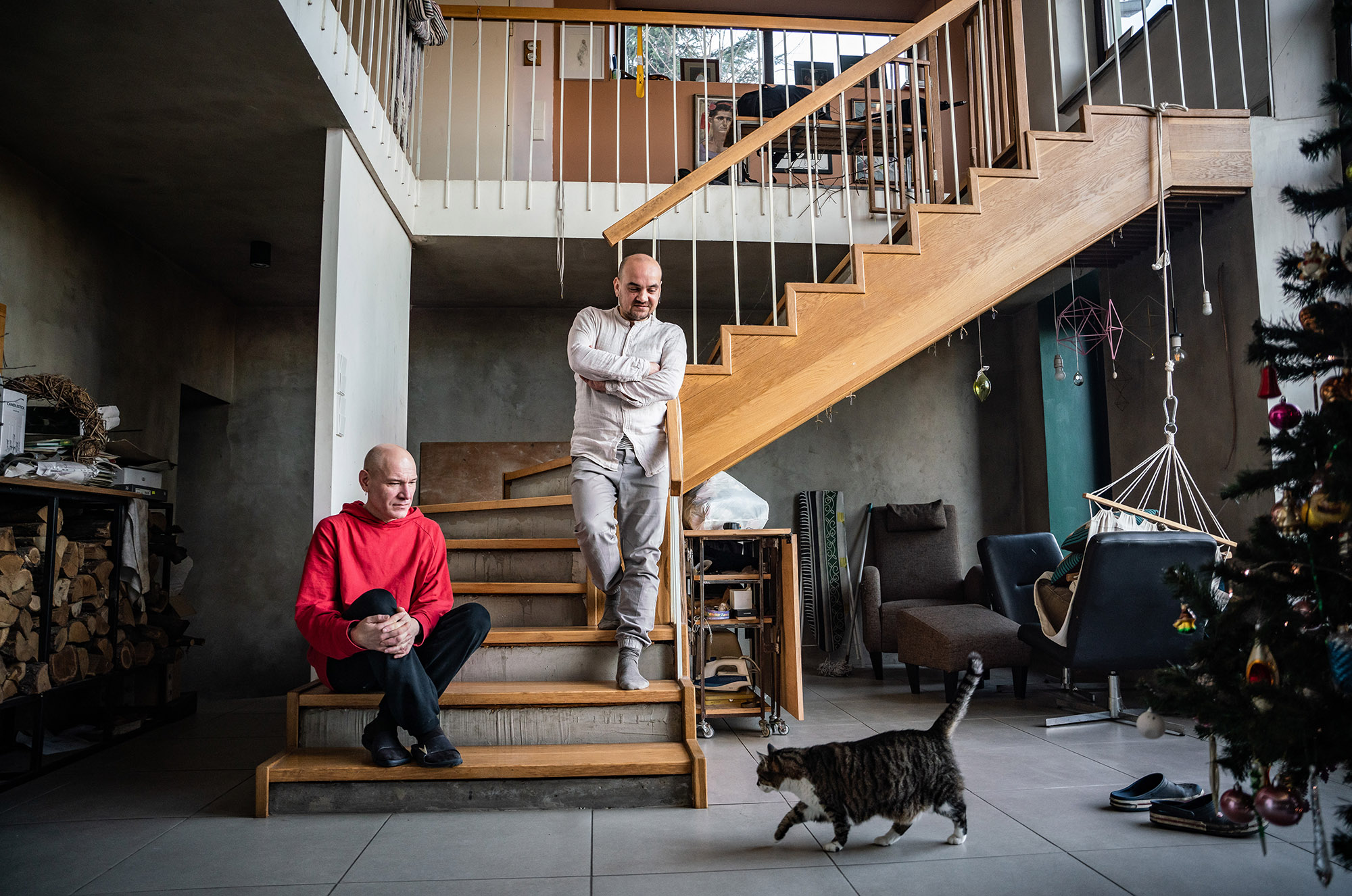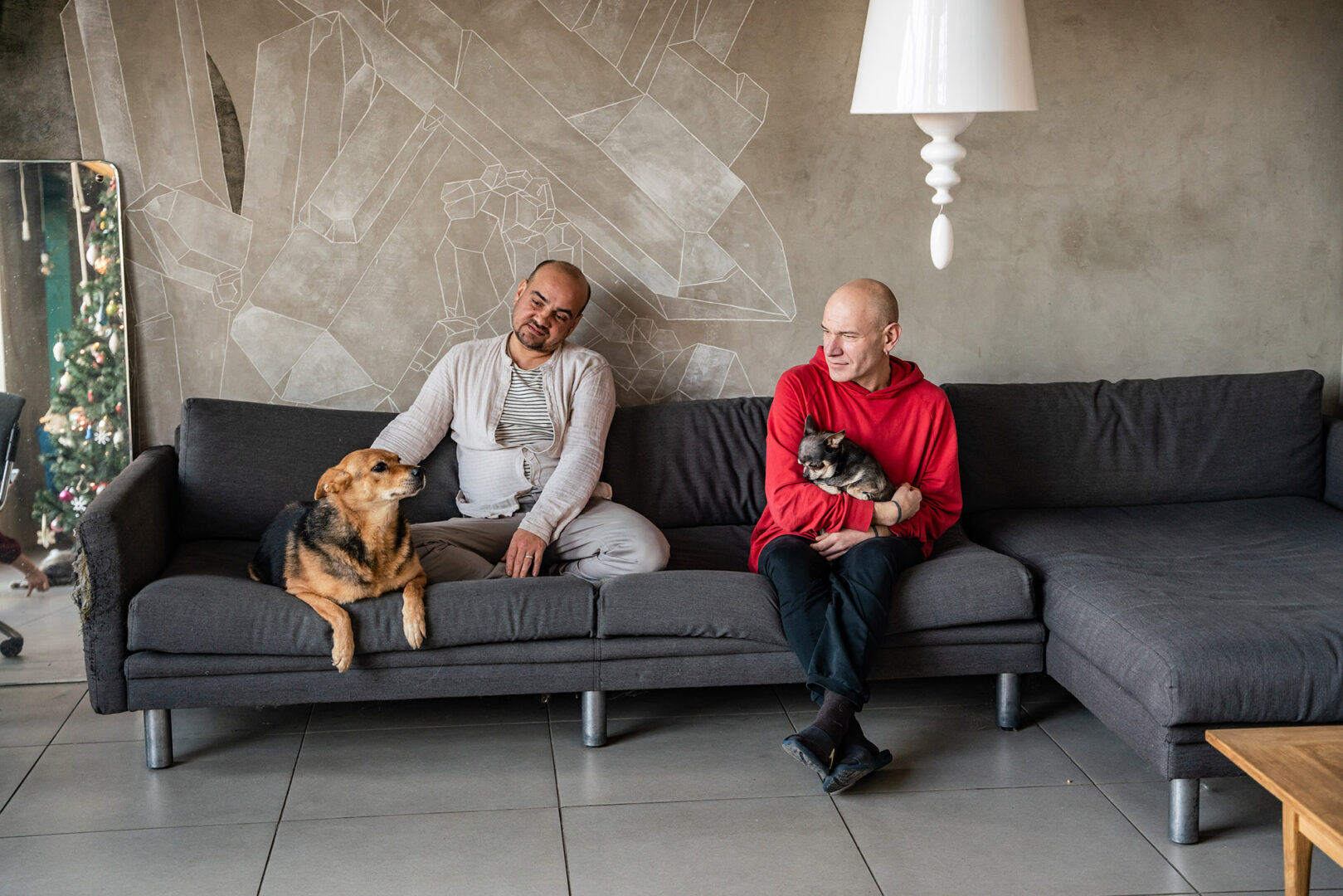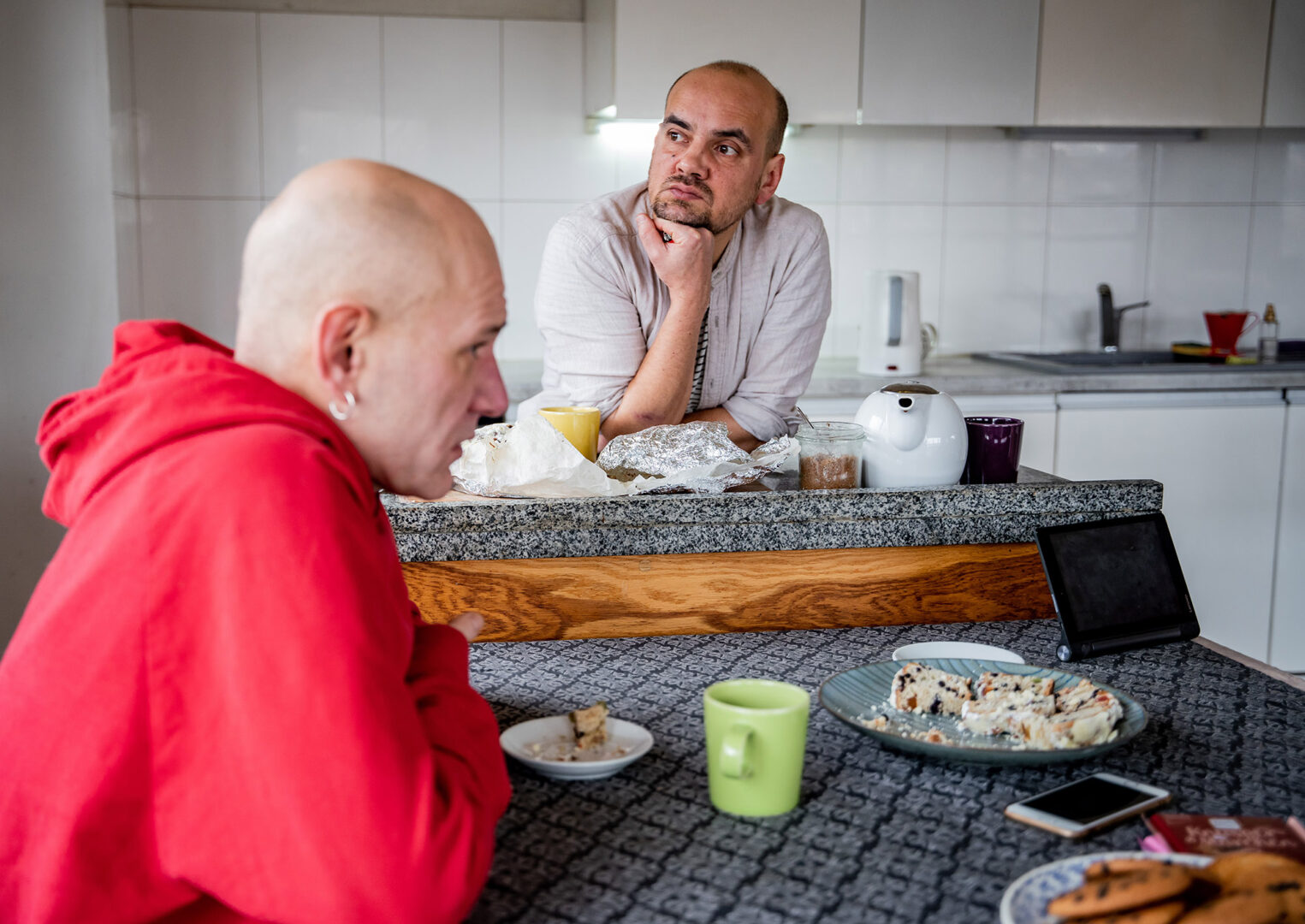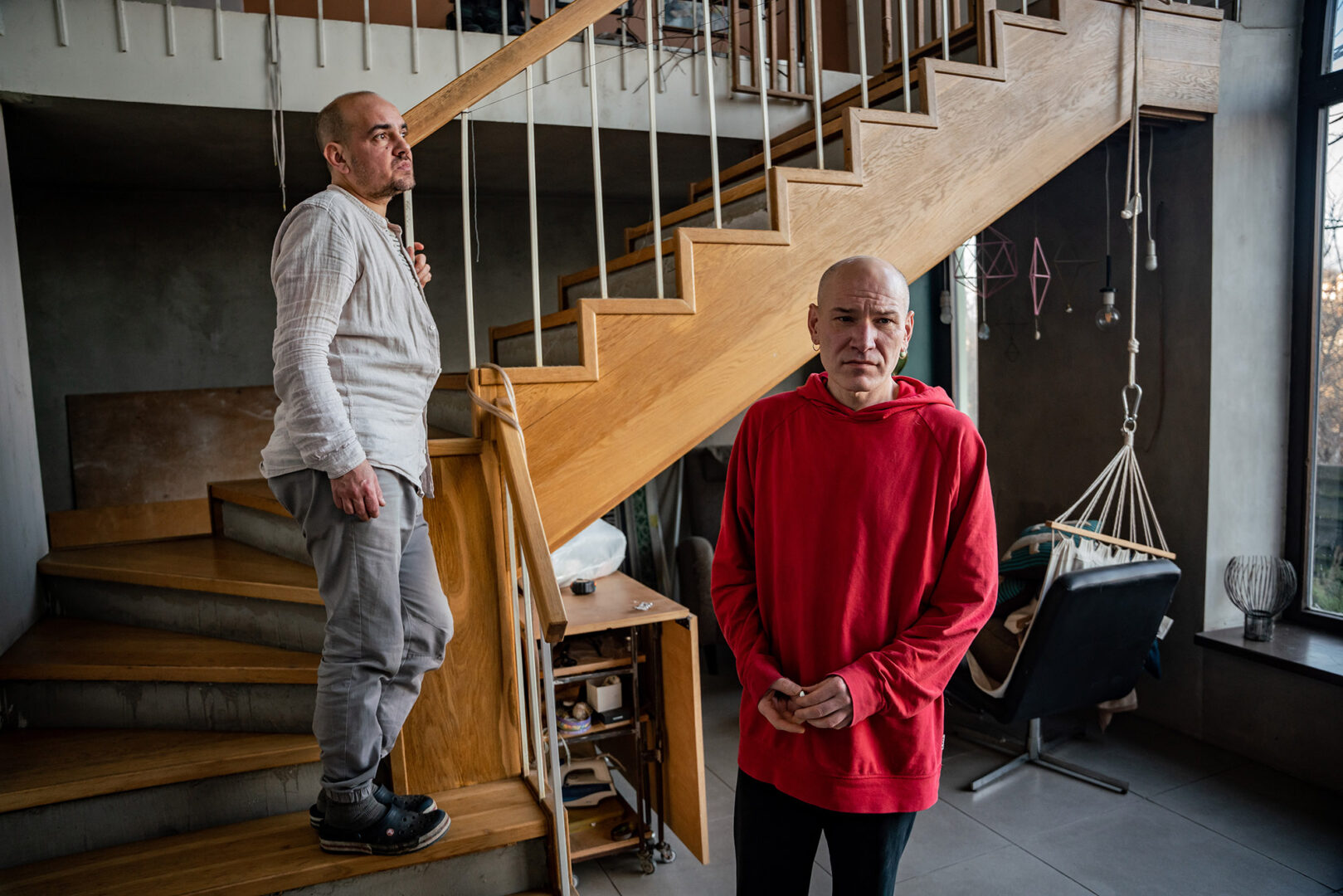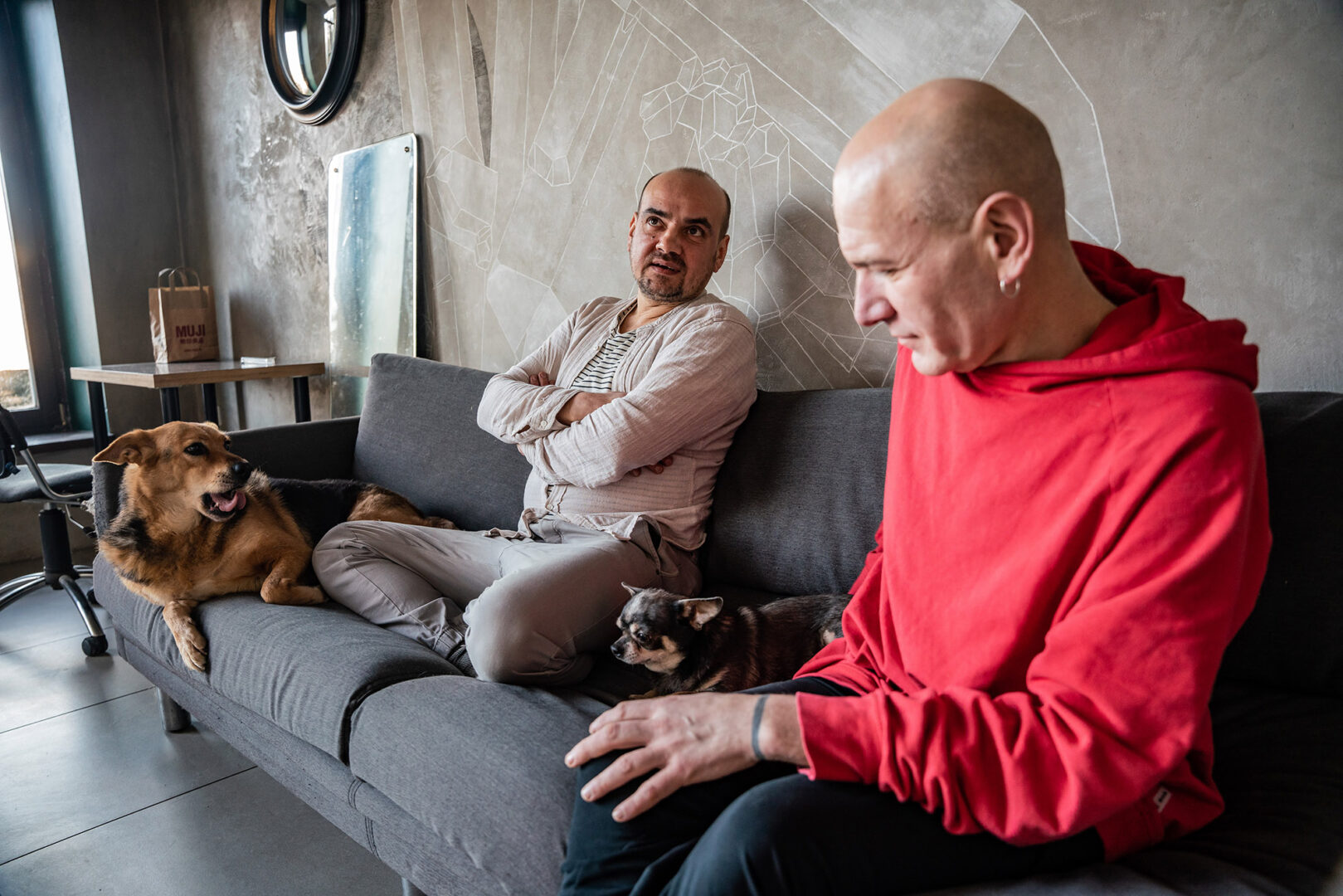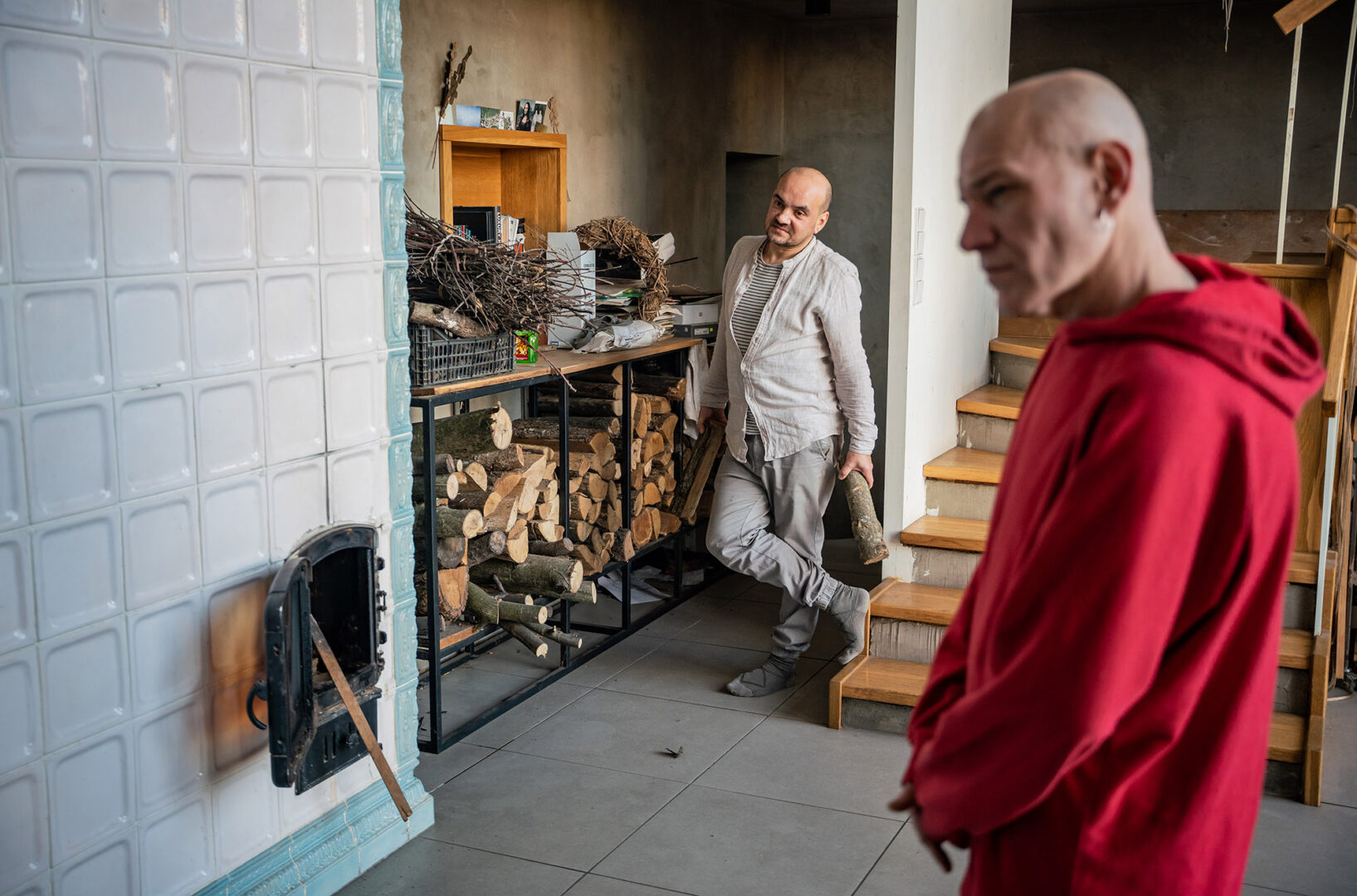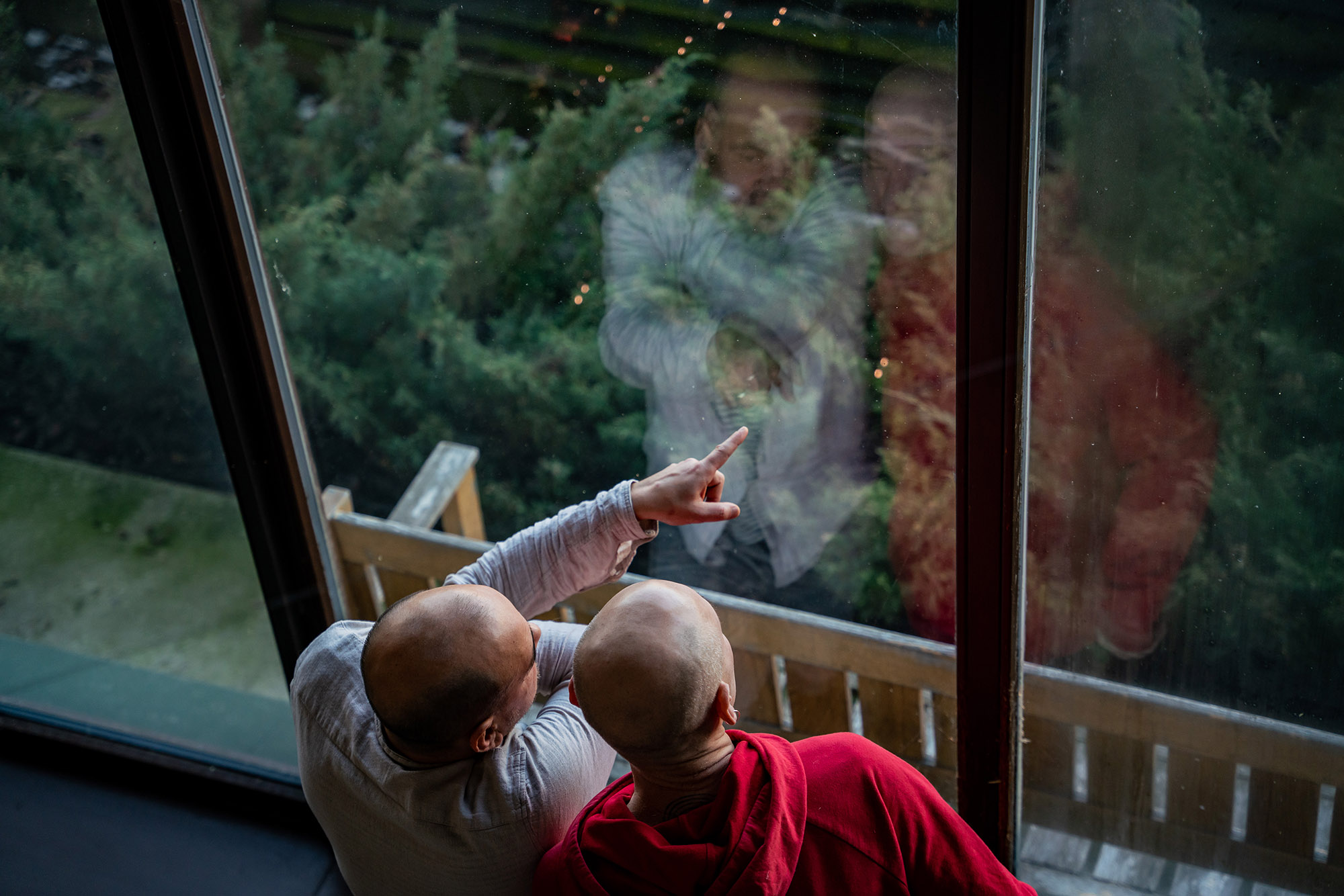
Men Looking for Men
“My life really began only at 33. Sasha and I had just moved in together: I went to work for the first time from the home we shared—and it was as if everything around was in slow motion. I could feel every ray of sunshine on my skin; on my way towards the cab, I memorized every step. The world was the same, but I became a completely different person in it—free from the public judgement and finally able to say: ‘Yes! I am gay.’”
After more than 17 years, the well-known 50-year-old Ukrainian hairstylist and the self-proclaimed “legend of the noughties” Oleksandr Sytnikov openly speaks of his homosexuality, no longer heeding to the societal norms. Standing in the kitchen of his house, he is slicing a Stollen he has baked himself and casually declares: “With all the changes these days, gays and lesbians have remained invisible. Most of them must be used to hiding, just as they had to do in the past.”
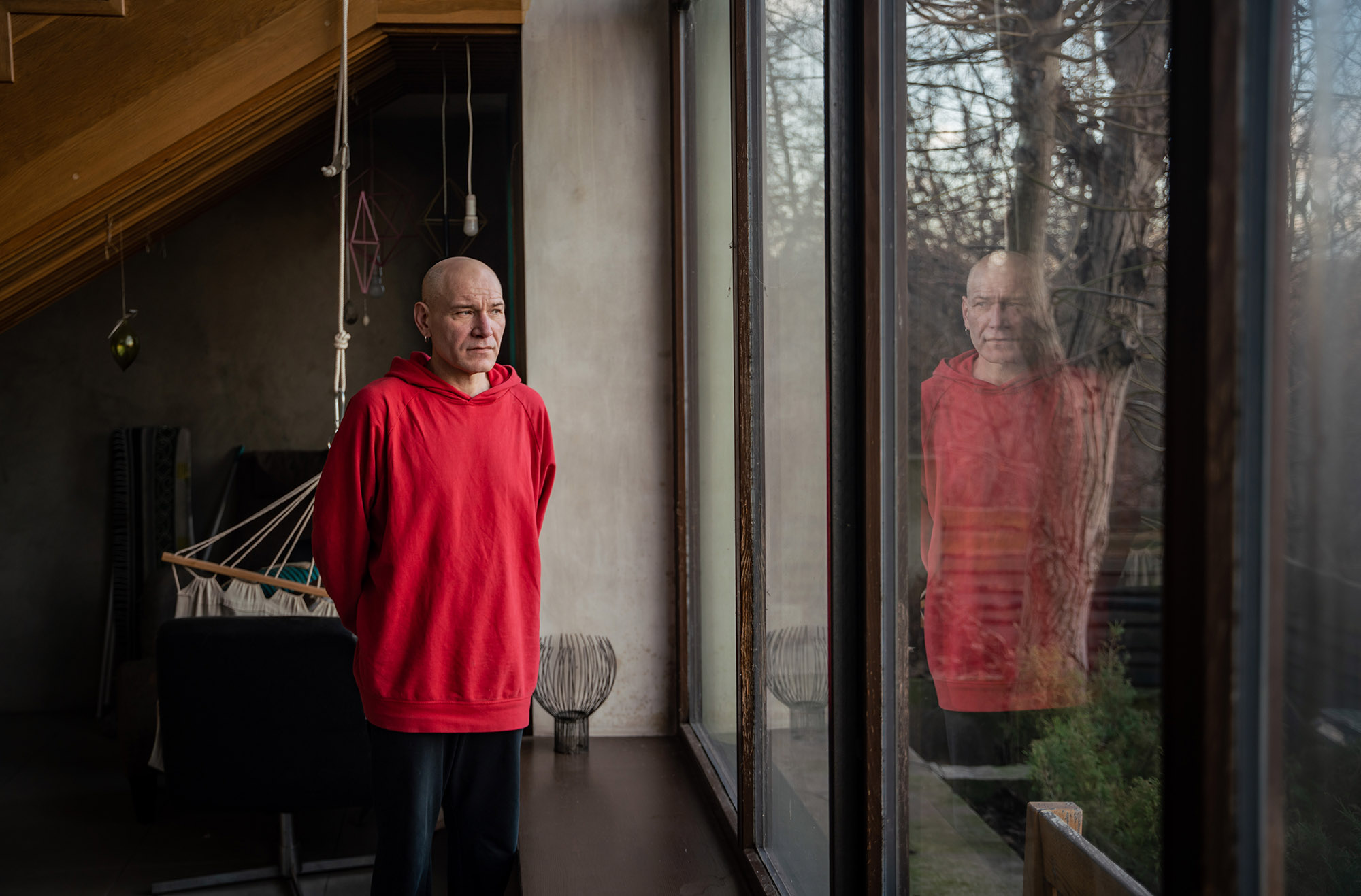
Before Ukraine gained independence in 1991, homosexuality had not just elicited strong public condemnation. As recently as 30 years ago, under Article 154 of the Criminal Code of the Ukrainian SSR, gays could be imprisoned for three to five years just for their sexual orientation.
And although actual court judgments were rare, men who liked men ran risk of being sent by a Communist Party committee to a psychiatric hospital for compulsory inpatient treatment.
Now, in 2021, despite the declared commitment to European values in the wake of the victorious Revolution of Dignity, openly representing the LGBTQ community in Ukraine is still dangerous. For love without limits, people get beaten up in the streets, ousted, fired from their jobs, or pressured legally.
“Still, this is not as bad as it used to be,” members of the older generation tell us. “Back in our day, you didn’t even know who you really were—there was simply no such thing as LGBTQ.”
A Tractor Driver from the Ternopil Region
In the sun-soaked gymnasium of a Luhansk high school, a gym teacher struggled to align his students, who were blinded by the barely warm but very bright springtime sun.
Outside, the early 1980s were making much headway. The global sexual revolution had long passed, but, in the USSR, publicly speaking about sex was still a taboo. The society at the time promoted raising children in the spirit of strict and traditional family values, with the general aspirations limited to “getting education, getting married as fast as possible, and having at least two children.” Those who were not equipped with such a firmware would often become hermits.
None of this seemed to bother the 15-year-old Andrii Kravchuk, one of the gym students blinded by the springtime sun. Short, slender, and inconspicuous in his appearance, Andrii watched his classmates with delight: stretched out like sticks, almost all of them noticeably blushed, they jumped over the pommel horse and chattered loudly. Andrii smiled, although he made sure to occasionally look away: it was too strange to just stare at people.
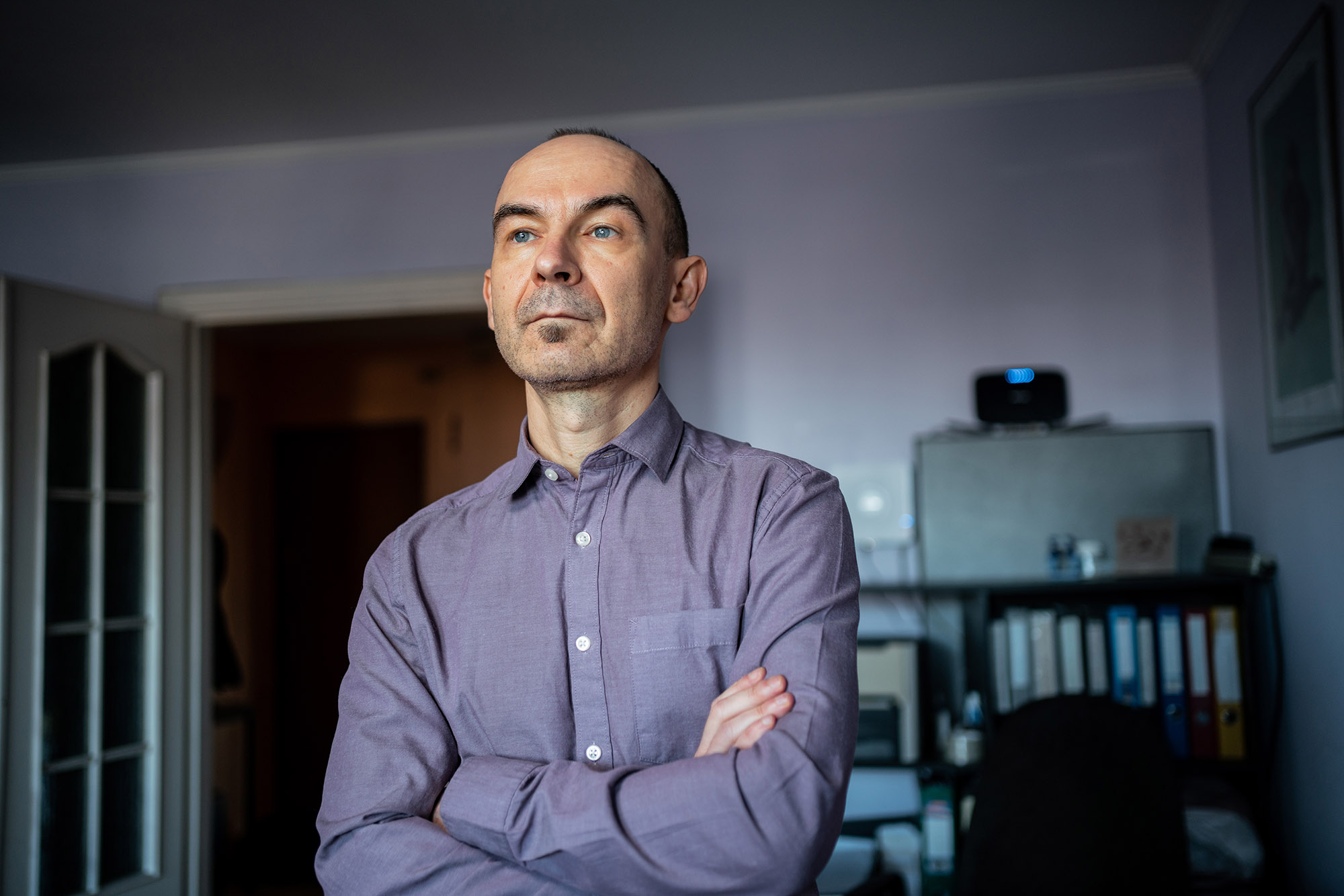
“At school, I thought I kept looking at the boys because I wanted to be like them,” he says. “Any sexual component was out of the question. How could I know the meaning of being gay almost 40 years ago?” It all came much later—during his service in the army.
Now, at 52, a sincere man with grey-blue eyes, Andrii remembers how, in a society where everyone was expected to be heterosexual by default, he struggled to identify for a long time, simply unaware of who gays were. He managed to find more or less meaningful information about homosexuality in the late ’80s in some books and magazines. However, it was much later, when he served in the military in Belarus and then during his studies at a Moscow university, that he realized he belonged to “the blue” (a Soviet slur for gays — R.). Television also played an important role in Andrii’s self-identification. The first time when Andrii heard about the LGBTQ community was in 1991 when he watched a TV program called “Quiet House” hosted by the Russian journalist Sergei Sholokhov.
“I watched, listened, read—I sought out the information about gay people from any available sources. I don’t remember the exact moment when I realized who I was, because everything happened gradually. I decided to confess about my sexual orientation to my parents when I was 26–27. I simply approached my mum and said: ‘You know, I believe I am gay.’ My mum was calm. I think she had guessed that there was a reason for my not dating girls. As for the family support, I was very lucky: we always had a great relationship. And my orientation did not change their feelings about me in any way.”
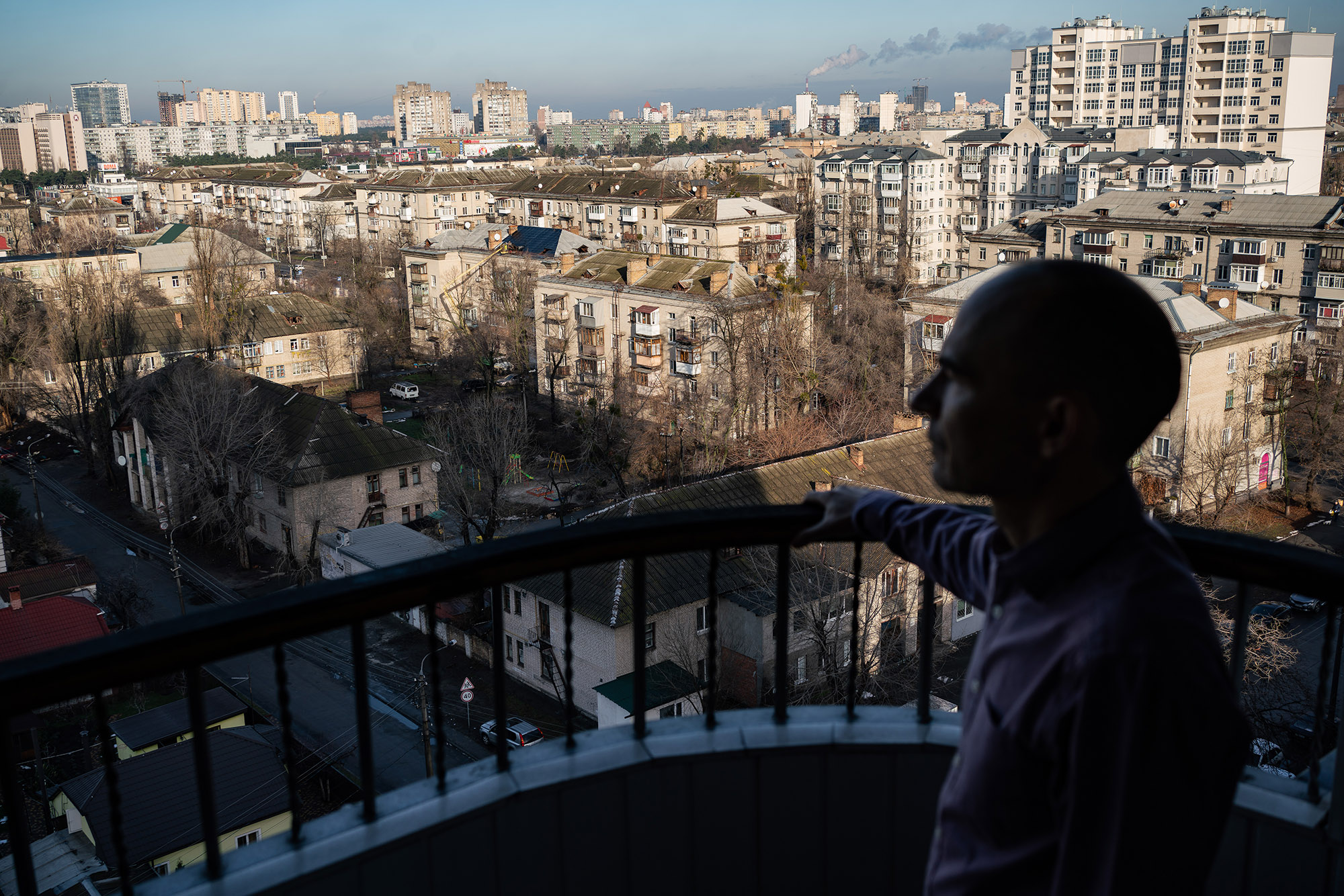
Outside the immediate family, Andrii came out for the first time when he met another gay man. Immediately after returning from the university to his native Luhansk, he did not dare to look for a partner. Besides, there was no place where he could look, except maybe among those in his own circle. Later, in the middle of the ’90s, one of the local newspapers featured a “Dating” section, where occasional ads of men looking for men first appeared. Andrii readily responded to one of them. Just wanted to talk to someone like him, he says.
“The attitude towards the LGBT community in Ukraine, I believe, began to change and take shape somewhere in the 2000s. With the Internet and a wider access to information, it became easier to identify oneself. At least, we knew how the attraction towards same-sex people was called; we could understand why we felt differently from everyone else, and we learned how not to be alone.”
For the last 20 years, since joining the community of the like-minded people in Luhansk and after finding the love of his life, Andrii has been fighting for equality between heterosexual and LGBTQ people. Together with the human rights advocacy center “Our World,” he provides legal and regulatory support, advocates for legislative changes for protection of sexual minorities, and keeps records of any human rights violations.
“In 2020, we recorded 230 violations of LGBTQ rights, of which about 80 were hate crimes,” he emphasizes. “The rest were incidents that did not violate the current laws, like verbal insults, for example.”
During his years as a human rights activist, Andrii amassed thousands of cases of discrimination against LGBTQ people. One of the letters he received left an especially indelible mark on him. It was a letter from an older man, a tractor driver from the Ternopil region, who happened to be born at the time when being gay meant being lonely.
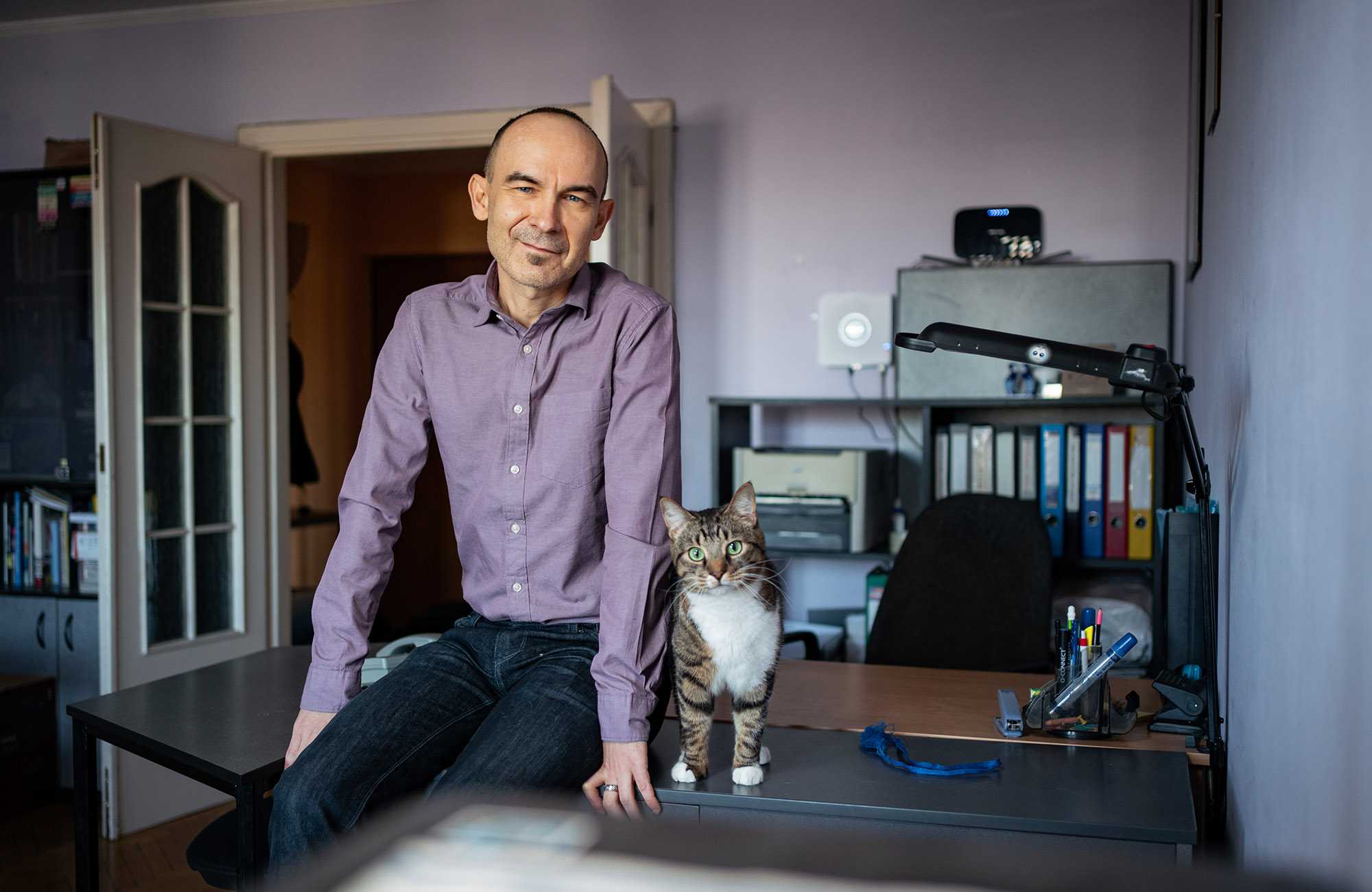
“He described how hard he worked and how he did not even dare to dream of love. In the letter addressed to our organization, the now old man wrote that the only joy in his life was occasional visits to the regional center, where gay men had a meeting place.”
“Now, everyone is free to go on a date, to have their own opinions, not to have to meet someone else’s expectations. Just imagine what it must have been like back in the day, though: once every six months, or maybe every few months, you could run up to town, looking for a few crumbs of joy.”
“And the rest of the time, you had to run away from your own true nature and live among people who will never accept and understand you for what you are.”
According to Andrii, most LGBTQ people of his age perceive themselves as people who grew up at the turn of the eras. Until December 12, 1991, homosexuality had been considered a criminal offence in Ukraine, so gays who are now in their 50s have been accustomed to living in private since their youth. They are less likely to seek help if their rights have been violated, less likely to participate in the Pride parades, and, despite the changing societal norms, even in retirement, they do not always allow themselves to be themselves.
“And this is a tragedy on its own,” the human rights activist and an openly gay man concludes. Because all people, regardless of gender and sexual orientation, have the right to happiness and family. I believe, meeting with my partner, which happened more than 20 years ago, was the most important event in my life. We lived together in Luhansk, and, when the war started, the two of us moved to Kyiv. I am happy to love and be loved. And it does not matter, whether I am 50, 60, or 70.”
Gay Life
Stanislav Naumenko, 55, says he was a “commissioned child”: the family of his father, an orthodox Jew, did not welcome his marriage to a Christian woman. His mother, was pondering whether to keep the child or not. His grandparents, however, demanded: “Don’t you even dare. Keep the baby. We will bring him up on our own.”
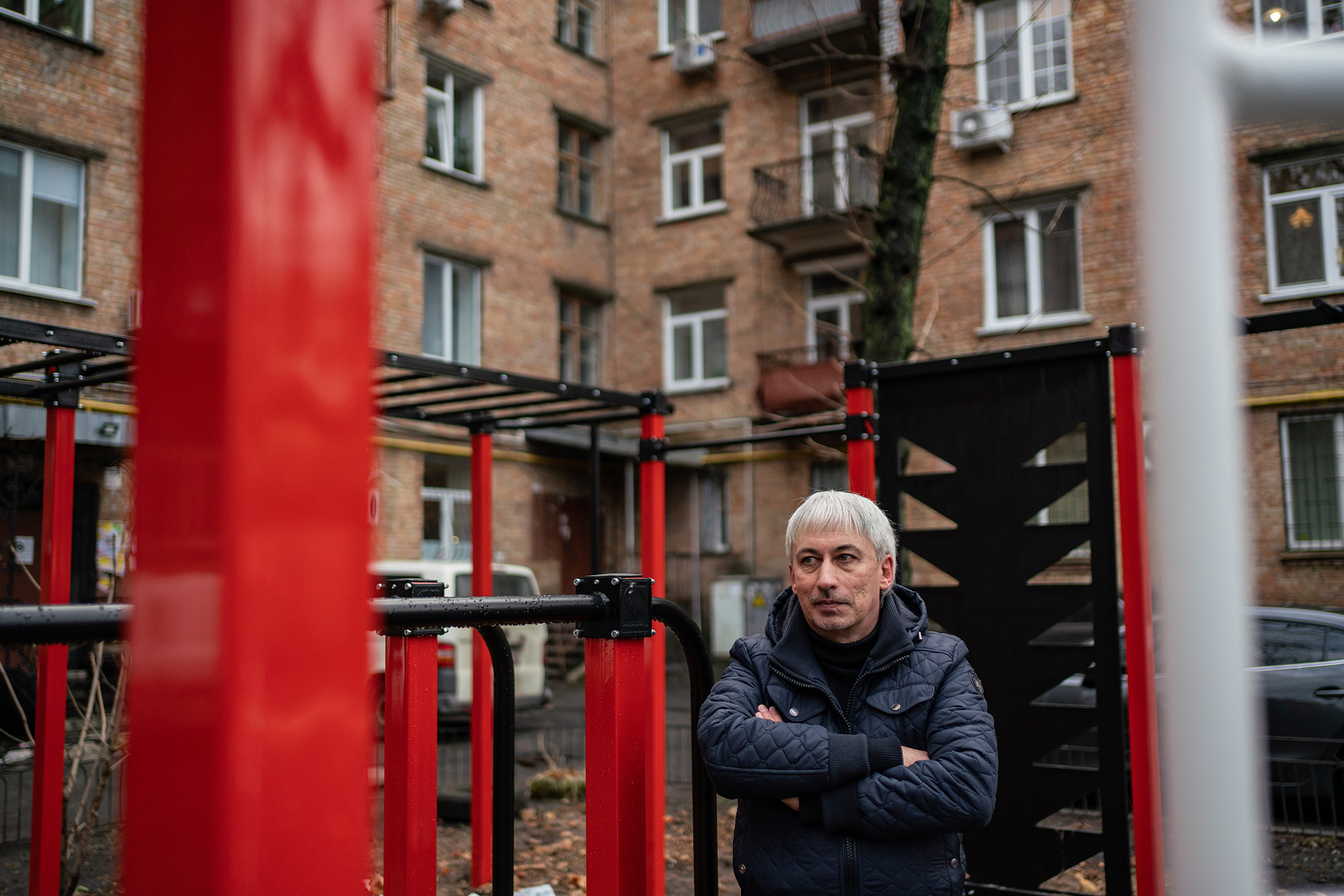
“That is how I was born,” he says, “by ‘an order’ of my older relatives. And although my mother and I lived in the same block, we have never had a real emotional intimacy. Apparently, this is when my inner restraint began to grow. Since my childhood, I have gotten so used to dealing with my own problems on my own.”
Wearing a dark-blue jacket and jeans of the same color, the grey-haired Stanislav is walking through a small park in a residential area in Kyiv, holding an issue of the Stonewall magazine in his hands. The magazine, where Stanislav is an editor, covers the life of the LGBTQ community in Ukraine.
Unlike other openly gay middle-age men, Stanislav does not remember the ’90s and their inherent looseness with fondness. Not because those changes were fundamentally wrong, but because the LGBTQ way of living in the 1990s and early 2000s did not match his understanding of love.
“It was like, you know, like breaking bad. Not always and, of course, not for everyone, but for many gay relationships became just the satisfaction of one’s own sexual needs. Basically, people would often meet somewhere in the bushes or in public restrooms. It was not for me. Not my style.”
In 1982, in the USSR, when Stanislav finished high school and the former KGB officer Yuri Andropov replaced the late General Secretary Leonid Brezhnev, very little had been known about LGBTQ people, to say the least. And although Stanislav had already realized that he fancied boys rather than girls, because of his inherent isolation, at first, he did not even try to look for a better understanding of his sexual preference.
“I did not care what others would think of me,” he says. “You can date girls all you want, but I am good on my own. Be it ’80s, ’90s, or ’00s, I wasn’t afraid of loneliness; on the contrary, I was better off being alone rather than having to live up to someone’s expectations, or just satisfying my sexual desires.”
As a child, Stanislav was fond of transport, so immediately after graduation, he trained for a trolleybus driver and got a job at a depot. He says that, by the 1990s, there already were at least a few gay men working at the Cherkasy trolleybus depot alone. They were neither insulted nor harassed; it seemed that even back then people did not care about others’ sexual preferences. In fact, homosexuality had just been decriminalized: gays started feeling freer and more social. In 1998, the first gay club in Ukraine, called “Rostok,” opened its doors in Kyiv.
“I cannot speak for everyone, but some of my gay peers in the ’80s self-identified thanks to older LGBTQ folks. Basically, older men would seduce the younger ones. Sometimes I think it would probably be better if I were seduced that way, too. But then I look back and realize that everything is as it should be. I have found my own way to self-identify, and I have never thought I was wrong about it. I have never even considered relationships with women. And I have come to this on my own.”
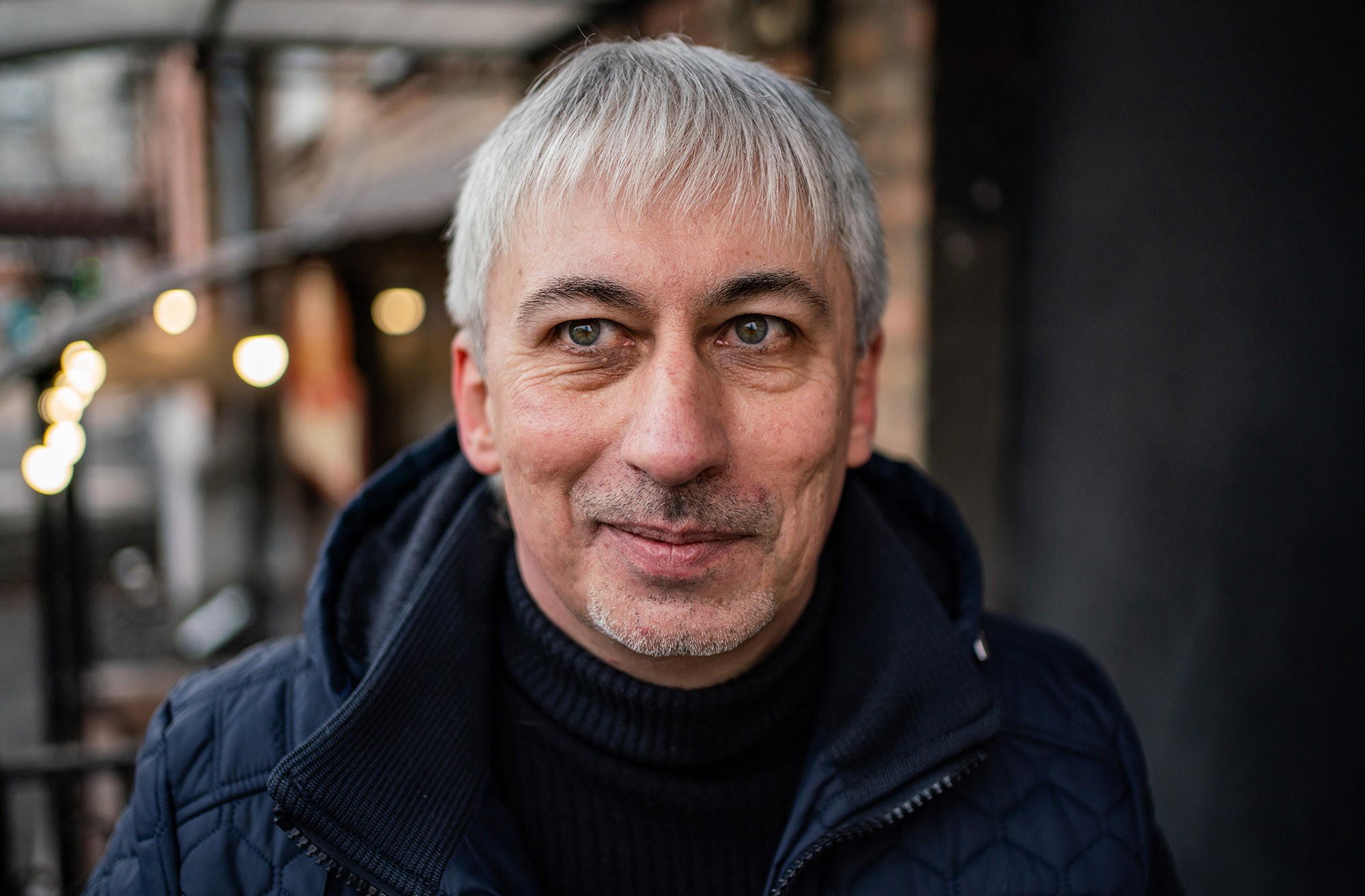
Stanislav says that gay life had not really existed in the USSR and, at first, not even in independent Ukraine. The older generation typically promoted occasional same-sex relationships, and nobody imagined fighting for anything long-lasting and real. Stanislav adds that, in the 1990s and early 2000s, gays began slowly coming out of the shadows; however, they would not dare to look for partners for life.
“Only now, Ukraine has been experiencing something I could call the real gay life,” Stanislav admits. “With everybody having the ability to access any information they need, they can themselves self-identify and choose the comfortable level of relationship.”
Subject and Law
In the 1980s, in the mining village of Nyzhnia Krynka in the Donetsk region, the life scenarios seemed to be same for everyone. Boys went to a mining school; girls went to a medical school. Some worked at the Yasynivka-Hlyboka mine; others, if they were lucky, found work at the local medical facility. Everyone had to get married, have children, and, ideally, settle down in their home village—to contribute to the development of Krynka, as their grandparents did before them.
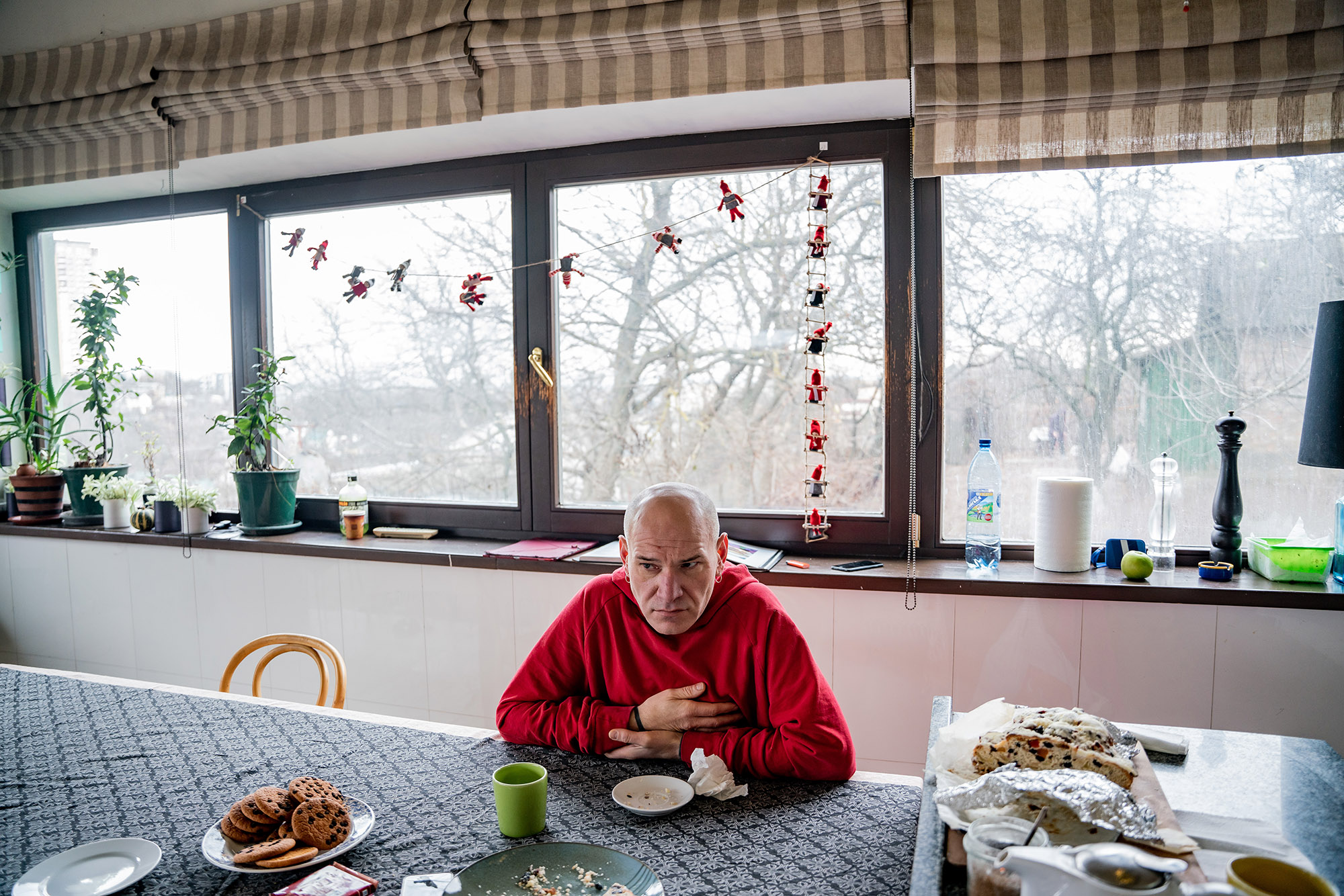
“I wasn’t happy with such a prospect, however. When I was 10, I realized that I wanted to be a hairstylist. Scholarship or not, to me, the mining college was not a dream come true,” Oleksandr Sytnikov says.
Now, at 50, he has won numerous hairstylist awards, has gained recognition, and has opened his own beauty salon in downtown Kyiv. Oleksandr smiles remembering how odd he looked next to his fellow villagers, how at first, he could not find any support among his relatives, and how he finally managed to prove that being born a boy in a working-class village in Donbass does not necessarily make him a miner.
“I managed to overcome the stereotype about my profession back in my youth, but it took a while to overcome one about my sexual orientation, so to speak,” he says in all seriousness.
Oleksandr got married for the first time when he was 20. His wife was 18, and they lived together for just 10 days. During his second and a much longer marriage, the hairstylist and his wife had two daughters. However, they eventually separated: Oleksandr decided to follow his heart and his feelings—for another man.
“Did I know I was gay when I got married?” he ponders while enjoying the fruit cake in his spacious kitchen. “I guess, I did. But when it came to having a family, the pressures of the heterosexual society were so strong that I could not resist it.”
“Yes, I have wonderful children, who are 25 and 27 now, and I am proud of them, and I love them very much. But to be honest, both of my marriages required too much effort. I had to force myself. My life began only when I was 33, after I met Sasha.”
Oleksandr Izotov, 44, came to Kyiv from Latvia, following his previous love, as he likes to call it. Yet the relationship did not work out, and Oleksandr started looking for a new partner in ICQ chats, which Sytnikov had joined out of curiosity, unable to hide his homosexuality any longer.
The men met a few hours after the first time they texted each other: they knew right away that they liked each other. In a few months, they started living together.
“And we have been living together for over 17 years,” says Oleksandr Sytnikov. “It is hard for me to find words to describe my first feelings. I just knew somehow that Sasha was the one. I fell in love. We built a house together, raised my children, adopted two dogs and a cat, strengthened our hairstyling business, and a few years ago, we got married in Denmark. Our marriage is recognized in the EU, but it has no legal force in Ukraine. I have a dream that, some day in the future, we will be officially acknowledged as a married couple in our home country.
The hairstylist’s parents, a schoolteacher and a miner, learned that their son had left his family to live with another man after their son’s outing (public disclosure about one’s gender or sexual orientation without their consent). It was Oleksandr’s ex-wife who had told her in-laws about their son’s sexual orientation, either out of a misguided sense of revenge or simply by accident. Although they were stunned at first, Oleksandr’s parents eventually relented and accepted their son’s true nature.
“I felt like I was on cloud nine! Eventually, we managed to agree to share our children’s custody, and our kids lived with us as well as with their mother. In the end, I came to understand how much I had offended my ex-wife. I had insulted myself, too: I ran away from my own true nature under the societal pressures. I suffered because I could not be who I really was. I tried building something that I could never really finish. But, for the outside world, I became the villain: I left my family, and I let everyone down.”
After he became free and truly happy, Oleksandr has vowed to never run away from his true nature again and to allow himself to be himself. He and Oleksandr are openly gay. They do not hide their relationship at work—nor do they parade their feelings in front of other people.
“When we are with friends, we can hold each other’s hands,” Oleksandr says. “But we would not kiss or hug out on the street. This is not about age or sexual orientation. It is just that this way is more convenient for us. We have changed our statuses on Facebook to let everyone know that we are in a relationship. We do not hide anything, but we won’t have any pictures taken in our bedroom. Couples should have their own intimate places, something completely hidden from other people’s eyes.”
Oleksandr Izotov and Oleksandr Sytnikov only once faced discrimination as members of the LGBTQ community: while on vacation in Koktebel, a security guard in one of the entertainment establishments verbally humiliated them and demanded the payment of 50 hryvnias.
“We had no idea why he was doing that,” Oleksandr recalls. “We told him that we wouldn’t give him any money and that we would call the police. After that, the security guard left.”
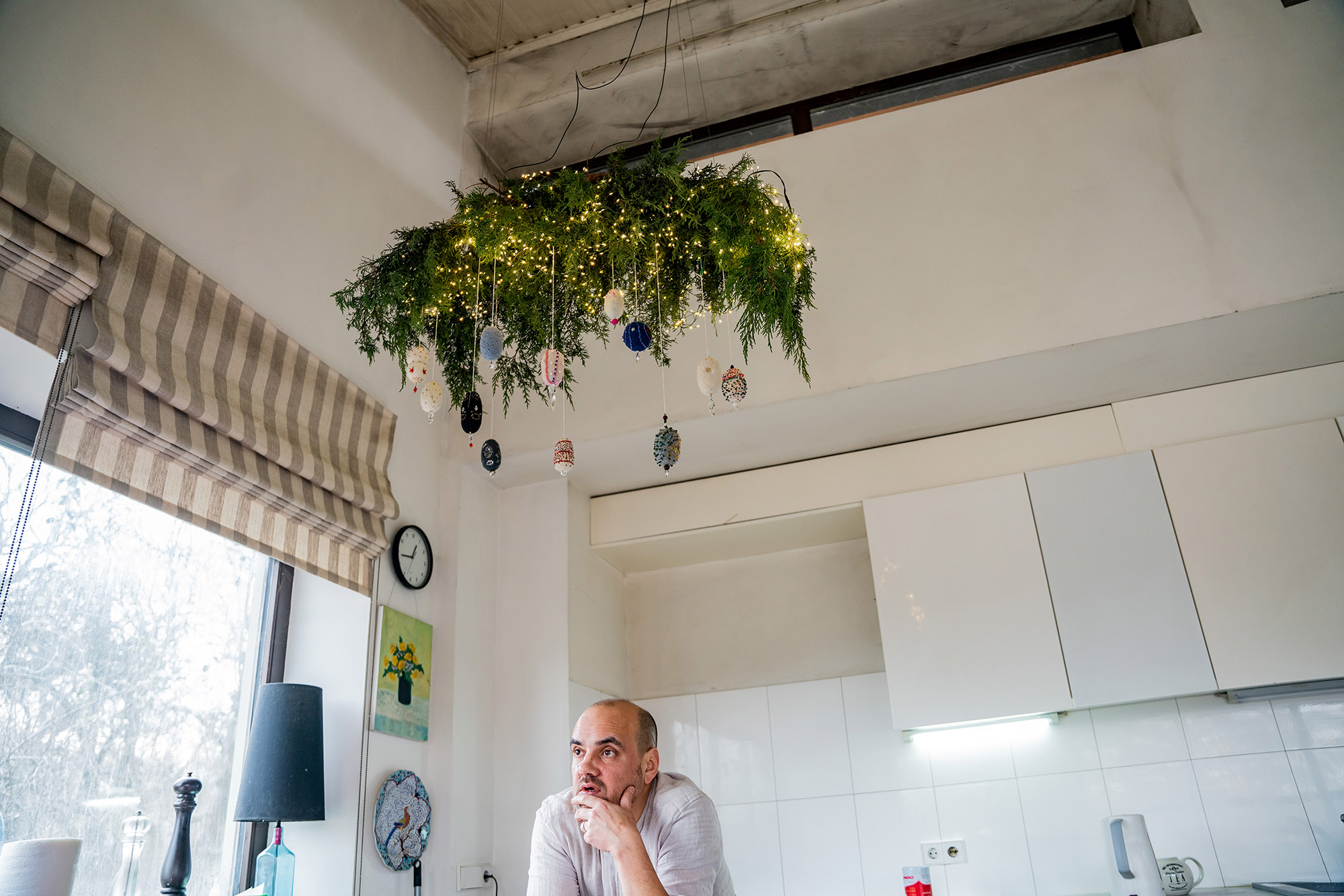
However, they often notice homophobia on social media. Perhaps the most offensive for Oleksandr were the statements made by the activists with whom he stood side by side on the Maidan. He said that during the Revolution of Dignity, those people seemed to be fighting for the European values as well, but in the end, they found themselves far from the notions of “respect” and “equality.”
“When we were at the barricades, everything was fine. Then the activists started befriending each other on Facebook. Some of them saw that I was in a relationship with a man, and things got heated, so to speak. I am not trying to keep anyone as my followers on social media: if there is something you don’t like, just unfollow me. But do try to stay human.”
Oleksandr says that most middle-aged LGBTQ people remain invisible in Ukraine, because they live in their own bubbles. They mostly mingle with people who do not need to pretend to be someone else. In the more developed countries of Europe, however, gays do not need to create their own bubbles. Sexual orientation has long stopped being a matter of contention in their homes.
“Let’s say, in London, where I had travelled for business quite often, the gay neighborhoods are literally dying out,” Oleksandr adds. “They are visited either by tourists or by the older members of the LGBTQ community. People go to gay clubs out of old habits, to have a drink, and remember how they fought for their rights. They have nothing to fight for now. In the civilized world, they are not condemned because of love. The LGBTQ community has the same rights as heterosexuals. In Europe, sexual orientation has ceased to be the subject of heated discussions.”
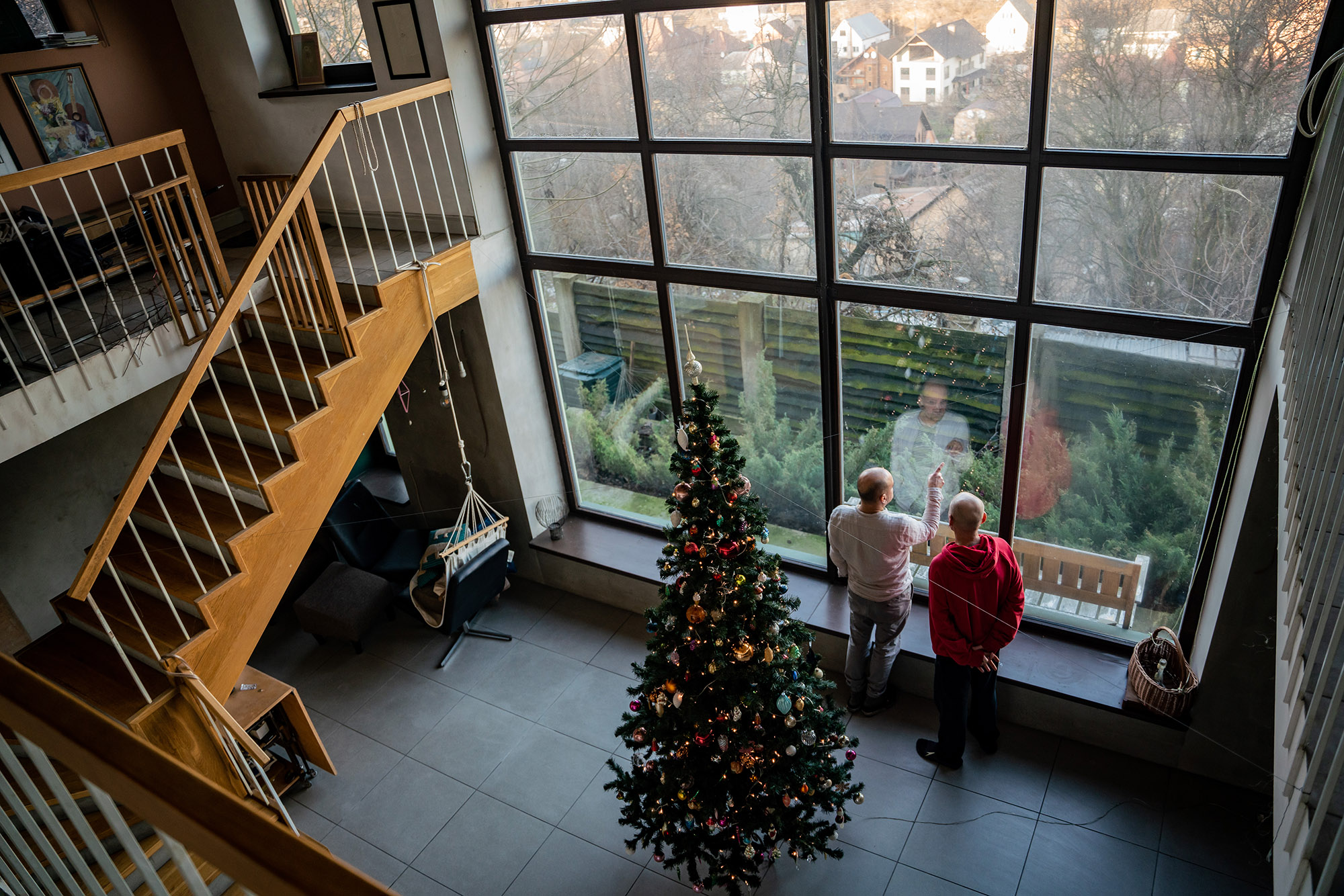
And although Ukraine has not yet reached such understanding of same-sex love, Oleksandr Izotov and Oleksandr Sytnikov are convinced that nothing can stop the changes that have begun in their home country, the changes that have made the Pride parade possible.
“It makes no difference that the parade is still protected by the police,” they say in the same breath. This is normal; this is how it happened in other countries, too. The important thing is that the changes are irreversible. If not our generation, then maybe the next one will get to experience the time when the LGBTQ rights are effectively protected by the law, and when asking someone whether they were homosexual or not would sound as strange as asking, “Are you heterosexual?”
[This publication was created with support of the Royal Norwegian Embassy in Ukraine. The views and opinions expressed in this publication are those of the authors and do not necessarily reflect the official position of the Norwegian government.]
Have read to the end! What's next?
Next is a small request.
Building media in Ukraine is not an easy task. It requires special experience, knowledge and special resources. Literary reportage is also one of the most expensive genres of journalism. That's why we need your support.
We have no investors or "friendly politicians" - we’ve always been independent. The only dependence we would like to have is dependence on educated and caring readers. We invite you to support us on Patreon, so we could create more valuable things with your help.
Reports130
More





